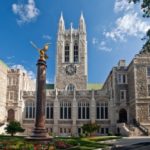How To Spin Your Vacation Into a Powerful High School Resume Builder

The school year is over. You’ve taken your last final, sat for your last AP exam, returned your textbooks, and cleaned out your locker. What’s next?
For many students the answer is some combination of summer programs, work, volunteer opportunities, or summer classes at a local community college. These are great choices if you are hoping to build up a strong resume and college application to match. After all, the most selective colleges will be interested not only in what you accomplish while school’s in session, but also in how you use your time productively when school is out.
If you’re reading this and wondering what that means for your summer vacation, don’t be discouraged. Vacation is an important and sometimes even necessary component of the summer. After the nose-to-the-grindstone pace you’ve kept up for the past nine months, you definitely deserve the chance to relax and de-stress a little before jumping headlong into the next big thing.
Does your summer vacation have to be a giant empty question mark on your resume and college applications, though? Absolutely not. The opportunities afforded through travel and extended time to focus on topics outside the classroom are invaluable. By capitalizing on these opportunities, you can ensure that your summer vacation is both the break you need and a strong contributor to your resume.
To learn more about how to maximize your summer vacation, including what you can do on your vacation to quantify your experience, how you can maximize social opportunities, and how to discuss these experiences on your resume, read on.
What can I do on my vacation to validate the experience?
1. Write a Blog
Maintaining a blog about your vacation is always a solid choice to document the experience and quantify your accomplishments along the way. You can choose a topic to focus on based on where you’re traveling and your existing interests. Some options could include the history, geography, industry, or geology of the area you’re visiting.
If you aren’t interested in blogging about something directly related to where you’re traveling, you can also use a blog to highlight other skills. If you enjoy writing, photography, or web design, your blog might draw attention to those skills, while documenting your travels or experiences along the way.
If you aim to highlight skills rather than the experience itself, your options for the actual content of the blog are fairly broad. You could choose something serious like socioeconomic problems facing the local community, something quirky like a tour of every hot dog stand in the zip code, something functional like a clickable map showing public restrooms and parks, or even something sentimental like the relationship between your grandmother and your mom.
Whatever you choose to do, be certain that you start your blog with a specific focus in mind — don’t just start writing and see where it takes you. Free-form writing without a goal is sometimes a good idea for personal growth and reflection, but your final product won’t function as a resume builder.
2. Take Advantage of Local Resources
Since you’re visiting someplace away from home, you’re likely to have access to unique resources. Look up special events, community offerings, and local experts ahead of time to maximize your experience.
Maybe there is a museum that you’d like to visit. Perhaps there is a talk from a naturalist at the local bird sanctuary or a volunteer opportunity happening over the weekend. Maybe your favorite author is doing a book signing at the corner bookstore. New locales usually mean new opportunities, and you should plan in advance if you want to capitalize on them.
Try to incorporate any special events or activities into some final product by the end of your trip. Writing a blog post, taking notes to include in a research paper later, or producing something tangible like a photography show will all highlight the validity of your vacation experience.
3. Take Advantage of Your Free Time
Sometimes, the best part of a vacation is just the downtime, away from the hustle and bustle of every day life. If you’re visiting a cabin in the woods for the week, you can still make the most of your experience by using this free time to focus on a skill or activity that you don’t usually have the time for.
You might consider creating a piece of art, working on some creative writing, or self-studying a new skill; for example, if you’ve been wanting to learn how to knit or how to speak a new language, this is the perfect opportunity to get started. Choose something you’re really interested in, but haven’t yet had the time to explore in as much depth as you’d like.
If you do teach yourself a new skill or work on your own creative project, again, try to find a way to quantify your accomplishment. If you’ve learned a skill, try to put it to use by creating something that you can donate or sell, or enroll in an online class or workshop to track your progress. If you’re working on something creative, consider putting together an art show or entering your work into a contest upon your return. This way, there is a clear product that results from your relaxing retreat.
4. Become a Connoisseur
If you’re interested in writing, hospitality, or the food industry, vacation can provide the opportunity to gain exposure to your field. You can easily quantify this by documenting your experience in the form of travel, food, or activity reviews.
Publish your reviews on your own blog, a Facebook page that you create, or on an existing travel review site like TripAdvisor. TripAdvisor allows you to earn badges and other recognitions for being a top contributor, and your experience of reviewing your travels can fine-tune your awareness of some of the finer points of food and hospitality services. Just be careful to keep your tone respectful and mature; you never know who might end up reading it.
In fact, your practice of writing these reviews could make for a unique college essay topic, if you find that it’s something you excel at and that you’re passionate about, too.
Of course, you don’t have to spend your entire vacation trying to validate the experience. Sometimes, your vacation experiences can work for you in other ways.
One way to capitalize on your travels and exposure to a new locale is to do lots of networking in a social setting. The hiring world often works through word of mouth, so travel and conversation can go a long way towards giving you the extra boost you need to bump your resume to the top of the pile if you happen to get lucky.
Strike up conversations with people in settings that suggest common interests or skills. For example, if you attend a lecture at a local nature center, talk to the presenter or facilitators after the presentation. Express your genuine interest in the subject matter, ask authentic and thoughtful questions, and request a card or email so that you can keep in touch.
You never know when the people you encounter will end up being adjunct faculty at the university of your dreams or the hiring manager at your top-choice company. Networking is a smart way to increase your reach and capitalize on the new experiences you’re afforded while on vacation.
How do I include my vacation on my pre-college resume?
If you’re on a short vacation, there’s no need to include the actual vacation on your resume. Instead, you can list specific parts of it under a section titled “Activities” or “Other Experiences.” This section can include things like lectures you attended, service projects you participated in, or independent projects that you undertook. There’s no need to mention that these occurred while on vacation, but there’s also no need to hide it if it should come up in an interview. Most interviewers will be impressed that you took the opportunity on vacation to seek out educational and beneficial experiences.
If you take a prolonged vacation, like a 3-month trip to Europe, you might include the trip itself under the Activities section on your resume. Don’t refer to it specifically as your vacation, but instead list it as something like “Three Month Travel Experience in Europe.” Don’t try to dress it up too much as a “Cultural Immersion Experience” or “Foreign Language Intensive Study” if it wasn’t genuinely one of those things. Under this item on your resume, you can list specific skills you developed as a result of this experience, including things like planning, adaptability, budget, and independence. Try to include specific examples with each of these skills to reinforce their authenticity.
These are also activities that you can include in your cover letter if you are finding them difficult to include on your resume. Your cover letter will usually summarize your work and other experiences, so it makes sense that if you have a gap in work or education on account of a vacation, you would explain it in your cover letter. In the case of a vacation, you can simply state where you went and what you accomplished while you were there. While tangible results are the best way to quantify your experience, you can also list the specific skills you developed along the way.
If you’re heading on a summer vacation, you should have a few goals for how you spend your time. First, be sure that you take the time you need to return refreshed and de-stressed. After all, that is the point of vacation, and if you spend two weeks working frantically to learn a semester’s worth of foreign language, you might return from vacation in need of another vacation! Instead, take the time you need to relax, and then use some of your remaining time to focus on valuable experiences.
If you can’t find valuable experiences in the area you’re visiting, try to produce something else that will quantify your time, such as a blog, a collection of art, or a portfolio of travel reviews. Finally, use your new locale to network with area professionals and academics. You never know when these connections might come in handy.
If you’re a high school student getting ready for summer vacation, don’t leave without a plan for how you’ll use your time and what your goals are while you’re there.
Looking for help navigating the road to college as a high school student? Download our free guide for 9th graders and our free guide for 10th graders. Our guides go in-depth about subjects ranging from academics, choosing courses, standardized tests, extracurricular activities, and much more!
For more information about quantifying your experiences and building a strong resume, check out these CollegeVine posts:
Want access to expert college guidance — for free? When you create your free CollegeVine account, you will find out your real admissions chances, build a best-fit school list, learn how to improve your profile, and get your questions answered by experts and peers—all for free. Sign up for your CollegeVine account today to get a boost on your college journey.
Can't see the form above? Subscribe to our newsletter here.


